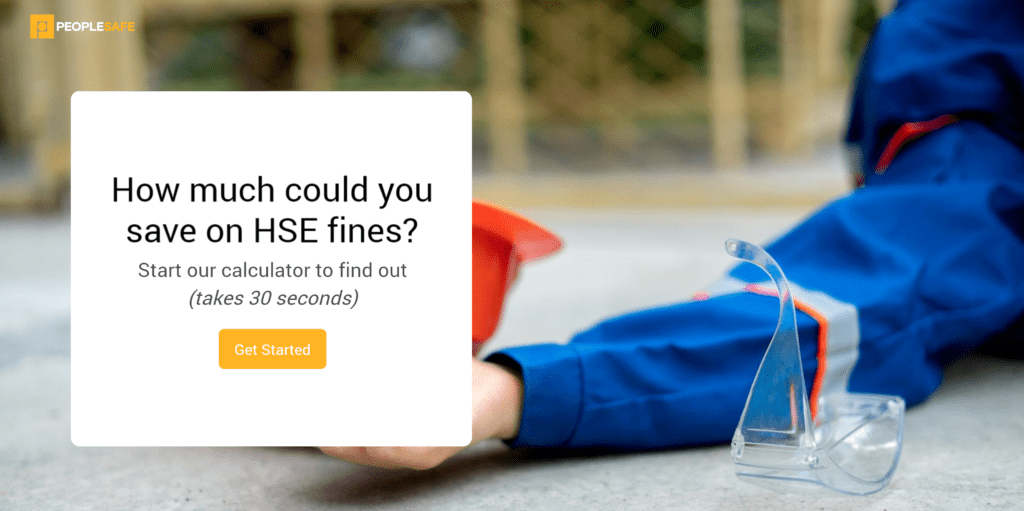What Is RIDDOR? Reporting & Responsibilities
The Reporting of Injuries, Diseases and Dangerous Occurrences Regulations (RIDDOR) is a piece of health and safety legislation that provides a structured approach to the way health and safety incidents are reported by employers.
Originating from the earlier Notification of Accidents and Dangerous Occurrences Regulations (NADOR) passed in 1980, RIDDOR was first introduced in 1995 and supersedes previous legislation, before being updated in 2013, bringing significant changes to the previous reporting requirements in order to simplify them.
RIDDOR applies to every workplace and puts duties on employers, the self-employed and people in control of work premises (the ‘Responsible Person’) to report and keep records of:
- work-related accidents which cause death;
- work-related accidents which cause certain serious injuries (reportable injuries);
- diagnosed cases of certain industrial diseases; and
- certain ‘dangerous occurrences’ (incidents with the potential to cause harm).
There are also special requirements for gas incidents.
Therefore, as an employer or ‘responsible person’, it is important to know exactly what the law says.
Why Is RIDDOR Important?
Reporting allows the enforcing authorities, including the Health and Safety Executive (HSE) and local authorities, to monitor accident trends, identify how risks arise and investigate serious accidents. They can then target their work to provide specific guidance and advice about how to avoid work-related deaths, injuries and ill health.
Since the introduction of RIDDOR, the long term trend for workplace accidents and injuries continues to fall. Between 1995 and 2023, the rate of fatal occurrences dropped by 48% (from 258), with a similar drop in non-fatal injuries. This downward trend signifies the effectiveness of RIDDOR in promoting a culture of safety and reducing the impact of work-related accidents.
However, despite this improvement, there is still a long way to go. In 2023/24, over 500,000 injuries occurred at work with 138 work-related deaths.
RIDDOR is in place to hold employers responsible for negligence or bad working behaviours. If employers fail to report incidents, they are breaking the law. By reporting any incidents as required, employers ensure that these risks are addressed, don’t escalate and are kept to a minimum. Additionally, reporting under RIDDOR ensures employers are fulfilling their duty of care as employers by dealing with any health and safety failings.
The legislation encourages organisations to follow health and safety procedures to help keep everyone safe while at work. A consistent health and safety record helps to protect the image and reputation of the company.
Reportable Incidents
In order to comply with RIDDOR, you need to report certain types of incidents and injuries to the HSE. Not all accidents need to be reported. A RIDDOR report is only required when:
- the accident is work-related
- the accident results in an injury of a type which is reportable.
For the purposes of RIDDOR, an accident is a separate, identifiable, unintended incident that causes physical injury. Under the legislation, there are four types of reportable injury.
Deaths
All deaths to workers and non-workers, with the exception of suicides, must be reported if they arise from a work-related accident, including an act of physical violence to a worker.
Specified injuries to workers
The list of ‘specified injuries’ in RIDDOR 2013 (regulation 4) replaces the previous list of ‘major injuries’ in RIDDOR 1995. They are:
- fractures (other than to fingers, thumbs and toes);
- amputations;
- any injury likely to lead to permanent loss of sight or reduction in sight;
- any crush injury to the head or torso causing damage to the brain or internal organs;
- serious burns (including scalding) which:
- covers more than 10% of the body; or
- causes significant damage to the eyes, respiratory system or other vital organs;
- any scalping requiring hospital treatment;
- any loss of consciousness caused by head injury or asphyxia;
- any other injury arising from working in an enclosed space which:
- leads to hypothermia or heat-induced illness; or
- requires resuscitation or admittance to hospital for more than 24 hours
The HSE have further guidance on specified injuries to workers.

Over seven day incapacitation of a worker
Accidents that result in an injury where an employee or self-employed person is away from work, or unable to perform their normal work duties, for more than seven consecutive days must be reported. This seven day period does not include the day of the accident but does include weekends and rest days.
Approximately 124,000 injuries with over seven days of absence were reported in 2022/23.
Injuries to non-workers
Work-related accidents involving members of the public or people who are not at work must be reported if a person is injured and is taken from the scene of the accident to hospital for treatment of that injury. There is no need to report incidents where people are taken to hospital purely as a precaution when no injury is apparent.
Reportable Occupational Diseases
Employers and self-employed people must report diagnoses of certain occupational diseases, where these are likely to have been caused or made worse by their work. These diseases include (regulations 8 and 9):
- carpal tunnel syndrome;
- severe cramp of the hand or forearm;
- occupational dermatitis;
- hand-arm vibration syndrome;
- occupational asthma;
- tendonitis or tenosynovitis of the hand or forearm;
- any occupational cancer; or
- any disease attributed to an occupational exposure to a biological agent.
The HSE have further guidance on occupational diseases.
Reportable Dangerous Occurrences
Dangerous occurrences are certain, specified near-miss events. The list of dangerous occurrences in Schedule 2 of RIDDOR outlines three types of reportable dangerous occurrences.
1. General (incidents occurring at any workplace)
These dangerous occurrences apply to all workplaces and include incidents involving, lifting equipment, pressure systems, overhead electric lines, electrical incidents causing explosion or fire, explosions, biological agents, radiation generators and radiography, breathing apparatus, diving operations, collapse of scaffolding, train collisions, wells and pipelines or pipeline works.
2. Incidents occurring at any place other than an offshore workplace
These incidents do not require a report if they occur at an offshore workplace. They include structural collapses, explosions or fires, releases of flammable liquids and gases and hazardous escapes of substances.
3. Incidents occurring at specific types of workplace
Industries with specific requirements are: offshore workplaces, mines, quarries and relevant transport systems.
RIDDOR Reporting Exemptions
Generally, reports are not required (regulation 14) for deaths and injuries that result from:
- medical or dental treatment, or an examination carried out by, or under supervision of, a doctor or registered dentist;
- the duties carried out by a member of the armed forces while on duty;
- road traffic accidents, unless the accident involved:
- the loading or unloading of a vehicle;
- work alongside the road (e.g. construction or maintenance work);
- the escape of a substance being conveyed by a vehicle; or
- a train
Who Should Submit A RIDDOR Report?
Only ‘responsible persons’ including employers, the self-employed and people in control of work premises should submit reports under RIDDOR.
There are also a number of special instances involving gas suppliers and engineers, working offshore, mines, tips, quarries, pipelines and wells where RIDDOR specifically lists the ‘responsible person’.
Employees do not have a legal responsibility to report incidents under RIDDOR. However, if employees witness or experience an incident that would fall under RIDDOR, they should report it to the appropriate person (e.g., their supervisor). It is not appropriate for injured persons, members of the public or others who do not have duties as ‘responsible persons’ under RIDDOR to use this reporting system. If you have a safety concern, you can report this to your union, employee representative or to the HSE using a different online form, here.
When & How To Submit A RIDDOR Report
The nature of the incident being reported will determine the procedure set out in RIDDOR:
- Fatalities, injuries and dangerous occurrences should be notified to the authorities by the quickest practicable means and have a full report submitted within 10 days.
- Accidents that result in the incapacitation of workers for over seven days must be reported within 15 days from the day of the incident.
- In occupational diseases, a report of the diagnosis should be sent without delay.
Prior to 2013, a report needed to be submitted when workers were incapacitated for over three days. Under the updated RIDDOR, you must still keep a record of over three day injuries (e.g. in your accident book), but they no longer require a report to be submitted.
All reports are made to the HSE and can be reported online using the appropriate RIDDOR form. Once completed, the form will be submitted directly to the RIDDOR database and you will receive a copy for your records. This must be kept for at least 3 years after the date of the accident; however, it is advised that RIDDOR records are kept for 5-6 years in order to allow time for any civil litigation to be made. A telephone system also remains for reporting fatal and specified injuries only by calling the Incident Contact Centre on 0845 300 9923 (Mon-Fri 8:30am – 5pm).
Reporting out of hours
The HSE and local authority enforcement officers are not an emergency service; however, the HSE does have an out of hours duty officer. The types of circumstances where the HSE may need to respond out of hours are:
- following a work-related death;
- following a serious incident where there have been multiple casualties; or
- following an incident which has caused major disruption (e.g. closure of roads or evacuation of people).
If an incident fits one of these descriptions, the duty officer can be contacted at 0151 922 9235.
Recording requirements
You must keep a record of any accident, occupational disease or dangerous occurrence which requires reporting under RIDDOR. Employers are generally advised to record all workplace accidents and near-miss incidents regardless of any impact on the employee’s ability to work. Typically, employers use accident books to record injuries which is sufficient to fulfil the injury reporting requirements.
Capturing details of any incident is a valuable management tool that can be used as an aid to risk assessment, helping to identify potential risks and develop solutions to mitigate them. Records, therefore, can help to build a picture of your organisation’s health and safety record, prevent injuries and ill health, and minimise costs from accident loss.
Peoplesafe provide a service to protect workers at risk by supplying staff with personal safety devices that are supported by our 24/7, dedicated Alarm Receiving Centre (ARC).
RIDDOR records must be provided when asked by the HSE or local authority and are required to be kept for a minimum of three years after the date of the last incident in the book.
What Happens If I Don’t Report An Accident Under RIDDOR?
As an employer, it is your duty to show due diligence to the legislation and you must be able to prove that you have taken steps to prevent similar incidents from happening again. By not following the correct procedure, you run the risk of being prosecuted by the HSE or local authorities. In cases where there is a failure to comply, there can be serious consequences.
- The courts can impose a custodial prison sentence of up to 2 years and a fine of up to £20,000 for the responsible person, or persons, and an unlimited fine for the business.
- Company directors can be disqualified under the Company Directors Disqualification Act 1986.
- Any health and safety offence can result in prosecution under section 37 of the Health and Safety at Work etc Act 1974.
- If guilty of gross negligence, manslaughter could be punishable by an unlimited fine and a maximum of life imprisonment.
- Injured workers or their families could pursue a civil claim.
What Should We Do Following A RIDDOR Report?
Reporting an accident, incident, or near-miss, is not the end of the process. Here are some steps to take following a RIDDOR report:
- Comprehensive Incident Analysis: Conduct a detailed analysis of the incident to identify contributing factors and root causes. This analysis should inform future safety measures and risk assessments.
- Update Risk Assessments: Review and, if necessary, update existing risk assessments to account for the insights gained from the incident. This may also include updating other organisational policies impacted by changes to your risk assessment and safety procedures.
- Review Staff Training: Assess the effectiveness of existing staff training programs considering the reported incident. Identify areas for improvement and provide targeted training to improve employee awareness of safety protocols and emergency procedures.
- Assess Current Safety Procedures: Consider existing workplace procedures and identify opportunities for improvement. Ensure that procedures are clear, easily accessible, and reflect the organisation’s commitment to maintaining a safe and healthy work environment.
- Review Displays, Signage, and Notifications: Evaluate the visibility and clarity of displays, signage, and notifications related to safety within the workplace. These should effectively communicate essential information and guide employees on safe practices at a glance.





